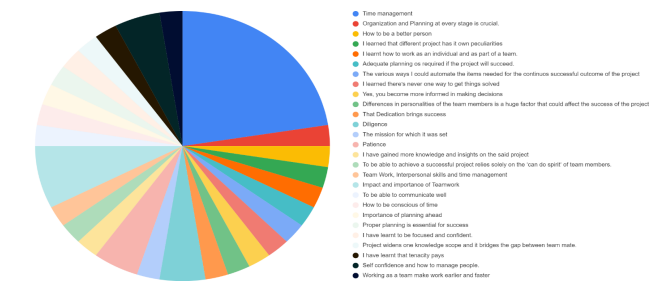Project performance and the effects of human activity: a case study of the University of Salford

Submission to VIJ 2023-11-10
Keywords
- Human activities, conflict, management, productivity, project managers
Copyright (c) 2023 David Oyekunle, David Preston, Florence Ibeh

This work is licensed under a Creative Commons Attribution 4.0 International License.
Abstract
Conflict is common in the project management industry. Project performance may be impacted negatively or favourably by human activities such as competing interests among stakeholders, project team members, and project managers, as well as by the intimidating methodology and structure of the project management process. This case study at the University of Salford looked into how human activity affects project management and performance.
The mixed methodology used in this study allowed for a deeper understanding of the real-world experiences of the subjects and project teams. Project management students and professionals from the University of Salford provided the data, which was collected. The survey generated a sample size of 40 responses, of which 37 were reliable enough for analysis.
At the University of Salford, it was discovered that relationships among team members were a crucial human activity that promoted cooperation, trust, and the extension of trust to others, thereby reducing conflict and ties of trust between stakeholders and project managers. However, positive team dynamics and strong group cohesion are required to actively and purposefully encourage conflict in order to achieve the project's aim, goals, and deliverables. Conflict in project performance and project management productivity, for example, may be reversed.
Therefore, to achieve high performance and productivity, the project management process needs strong communication, positive team dynamics, and an understanding of scope. Conflict can have a negative effect on the process, lowering productivity and performance. Project managers should develop their communication skills to avoid this because it is a soft skill that can be learned and enhanced. This guarantees proper coordination, awareness of all stakeholders, and a decrease in conflict.
References
- Alias, Z., Zawawi, E. M. A., Yusof, K., & Aris, N. M. 2014. Determining Critical Success Factors of Project Management Practice: A Conceptual Framework. Procedia - Social and Behavioral Sciences; Elsevier BV. https://doi.org/10.1016/j.sbspro.2014.10.041
- Belout, A., & Gauvreau, C. (2004). Factors influencing project success: the impact of human resource management. International journal of project management, 22(1), 1-11. https://doi.org/10.1016/S0263-7863(03)00003-6
- Bryman, A. (2012). Social Research Methods. 4th Edition, Oxford University Press, New York
- Deutsch, M. (2006). Justice and conflict. In M. Deutsch, P. T. Coleman, & E. C. Marcus (Eds.), The Handbook of Conflict Resolution: Theory and practice (43–68). San Francisco: Jossey-Bass.
- Hill, R. E. (1977). Managing interpersonal conflict in project teams. Sloan Management Review, 18(2), 45—61.
- Imran Amen, Luqman Muhammad, Zaki Amir (2016). Impact of human capital practices on project success. Kuwait Chapter of Arabian Journal of Business and Management Review. Vol 5. No 6, February 2016
- M. Huemann, A. Keegan, J.R. Turner Human resource management in the project-oriented company: a review Int. J. Proj. Manag., 25 (2007), pp. 315-323 https://doi.org/10.1016/j.ijproman.2013.12.002
- Müller, R., & Jugdev, K. (2012). Critical success factors in projects: Pinto, Slevin, and Prescott–the elucidation of project success. International journal of managing projects in business. (International Journal of Managing Projects in Business ISSN: 1753-8378
- Obi, R. (2012). Stress and conflict in organization. In Ogunbameru O.A.(ed), Industrial Sociology, Ibadan, Spectrum Books Ltd
- Hocker, J. & Wilmot W. (2013). Interpersonal conflict, 9th ed. McGraw Hill, Higher Education
- Oluikpe, P., 2015. Knowledge creation and utilization in project teams. Journal of Knowledge Management, 19(2), pp.351-371.
- Pinto, J. K., & Slevin, D. P. (1988, February). Project success: definitions and measurement techniques. Newton Square, PA: Project Management Institute.
- Vaux, & Kirk (2018). Relationship conflict in construction management: Performance and productivity problem. Journal of Construction Engineering and Management, 144(6), 04018032. doi.org/10.1111/1540-5885.2002004
- Wallensteen, P. (2015). Understanding conflict resolution. Sage.
- Wilemon, D. L. (1984). Project management education for the 21st century. Project Management Journal, 15 (Special Summer Edition), 24–31